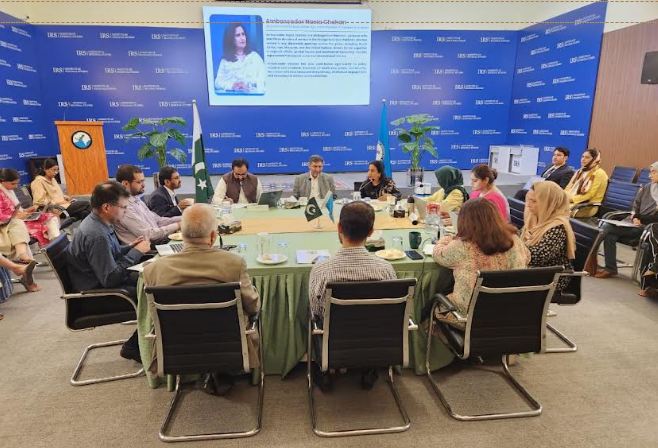ISLAMABAD, SEPT 30 /DNA/ – Speakers at a roundtable held at Institute of Regional Studies expressed grave concern over the escalating dispossession and statelessness of Bengali-speaking Muslims in Assam, India. The discussion highlighted how discriminatory policies, arbitrary legal practices, and systemic marginalization under the BJP government have created a humanitarian crisis with regional and international implications.
Ambassador Jauhar Saleem underscored that India, despite branding itself the “world’s largest democracy,” has stripped nearly 1.9 million people of citizenship under the 2019 National Register of Citizens (NRC). He noted that Foreigners’ Tribunals exploit clerical errors to render people stateless, while entire families, including children, are denied their fundamental rights. “Citizenship—the foundation of all other rights—has been eroded in Assam,” he stated, calling these measures a violation of international human rights law.
Ambassador Naela Chohan emphasized that this manufactured statelessness is driven by ethno-religious discrimination. She noted that Bengali-speaking Muslims, despite their generations-long presence in Assam, are branded as “illegal” and subjected to arbitrary evictions and deportations. “These policies deepen poverty, fuel insurgencies, and erode human dignity,” she warned, adding that historical prejudices and Hindutva-inspired exclusion are systematically marginalizing Muslim communities.
Dr. Natalie Brinham drew parallels between the plight of Bengali Muslims in Assam and the Rohingya in Myanmar, stressing that both groups face dispossession through manipulated citizenship and identity systems. She termed this crisis “mass citizenship stripping,” describing it as a deliberate, state-led process that criminalizes communities with deep roots in their homeland.
Mr. Asad Shabbir highlighted the toxic propaganda environment, where senior BJP officials label Bengali Muslims as “termite infiltrators” to justify exclusion. He cautioned that such rhetoric normalizes dehumanization and fosters Islamophobia, not only in Assam but across India and South Asia.
Mr. Mukhlees Ur Rehman shed light on the brutal ground realities, arbitrary detentions, forced deportations, and entire families abandoned in no man’s land. He warned that the crisis risks destabilizing the wider region, with Bangladesh already raising concerns about spillover effects.
Participants called on the international community, human rights organizations, and neighboring countries to take urgent notice of the crisis. They stressed that India’s actions violate Article 15 of the Universal Declaration of Human Rights and the Convention on the Rights of the Child, undermining its global credibility on human rights.
The roundtable concluded that unless India shifts from exclusionary practices toward inclusive governance, the crisis will deepen, destabilizing both Assam and the wider South Asian region.

















